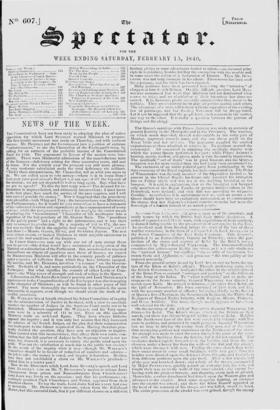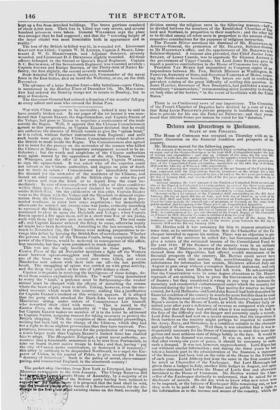Ac err from Iedia esnes ;erne .rzsnind ns of the
uncertain and
costly tenure by which the British hole their Asiatic dominions. A series of expensive and bloody wars, with acquisitions of fresh territory, is deemed indispensable to the preservation tff our empire in the East. An overland mail from Bombay brings tleu story of the last of these warlike operations, in the form of a despatch from 1.01'd At-CI:WSJ) to the Secret Committee of the East India C.unpanr. This despetch, published in an Extraordinary flazette on Thersitts., states the par- ticulars of the storm and capture of Kelat by tbe British troops, commanded by Major-General Witt.ssiums. The Governor-General considers this achievement hiehly impel-tent, as it not only vindicates the "national honour," but confirms "the severity of intercourse be- tween Sinde and A fghanisten," and promotes " the tranquillity of the restored monarchy."
From the general orders issued by Lord AITM.AND we Icarus the na- ture of the Khan of Kelat's offence. Thoegla professing amity whit the British Government, he instigated the tribes in the neighbourhood of the Bolan Pass to commit " outrag.es and murders " on the followers of the Army of the Indus. To " exact retribetion." and to make ar- rangements for future security, General Wn.ssitinis was directed to march upon Kelat. He arrived at Giranee, eisht miles from Kelat. on the 12th of November. His force consisttei of 11•; rank and file, With the necessary number of officers; belonging chiefly to the Seeend or Queen's Royal Reuriment, the Seventeenth Regiment. the Thirty -first Restiment of Bengal Native Infantry. with Sappers, Miners, Pioneers, and Horse Artillery. The three, thoenr11 seeol, appears to have been well selected for the duty.
On the morning of the lath of November. General ItVimstrun left Giranee for Kelm. The Khan's troops mtnelied the British on their march, and there was skirmishing till Within a mite K Mat. IIeiehts on the North-west face of the fort were covered by iefantry. with five guns in position, and protected by small parapets. General WILISIIIRE lost no time in driving the enemy from their post, end at the SAIlle time occupying gardens and enclosures on the North-east of the town. An attempt was made to enter the town thronell the gates It the seem time with the fugitives frola the heights. but it did not succeed. 'The assaiiants dashed rapidly forwerd from the 1.eithts..mn1 from the en- closures, under a heavy tire from the walls of the fort and the eitadtl, Which were throneed with 'Melt. thegates closed. they wi:h- dreW miller cover of ieene small buildings. while two gems from the heights were directed. upon the defences above the gate. and four others from different positions upon the gate itself. After a few rounds. half of the gate was knocked clown ; and a body of the troops, commanded by Major ProitNtamees, quickly gained all CAtiallee into the i'.)11, and fought their way ep to the walls of the inner vita...fol.—the enemy be- having with the greatest bravery, and disputing every inch of ground. Meanwhile, another detachment had forced open the Western gate and advanced to the citadel. After some desperate fighting. an entrance into the citadel was foisted and there the Khan himself appeared at the head of the remnant of his troops. :mil was killed, sword in hand. The entire posse:i.:ion of the citadel was soon gained, though the enemy kept up a fire from detached buildings. The brave garrison consisted of about 2,000 men. Their loss in killed was very severe, and several hundred prisoners were taken. General WILLSHIRE says the place was stronger than he had supposed ; and that the " towering height of the inner citadel was most formidable both in appearance and in reality." The loss of the British in killed was 31, in wounded 108. Lieutenant GRAVATT was killed; Captain W. M. LYSTER, Captain J. SEALY, Lieu- tenant J. W. 0. HoLnswciarti, and Adjutant Siamioxs, severely wounded, and Lieutenant D. J. DICKINSON slightly wounded. All these officers belonged to the Second or Queen's Royal Regiment. Captain S. C. Borncs 1ER, of the Seventeenth Regiment. was wounded severely ; Captain SAURIN and Ensign ROPPER, of the Thirty-first of .Native In- fantry, the first slightly, the second severely wounded. Rear-Admiral Sir FREDERICK MAITLAND, Commander of the naval force in the East Indies, died on board the Wellesley, at sea, on the 30th November.
The advance of a large Russian force—fifty battalions—upon Chiva, is mentioned in the Bombay Times of December 7th. Mr. MACNAGH- TEE had ordered the Bombay troops not to return to Bombay, but to stop at Gundava. The Governor-General had ordered a donation of six months' full pay to every officer and man who crossed the Bolan Pass.



























 Previous page
Previous page